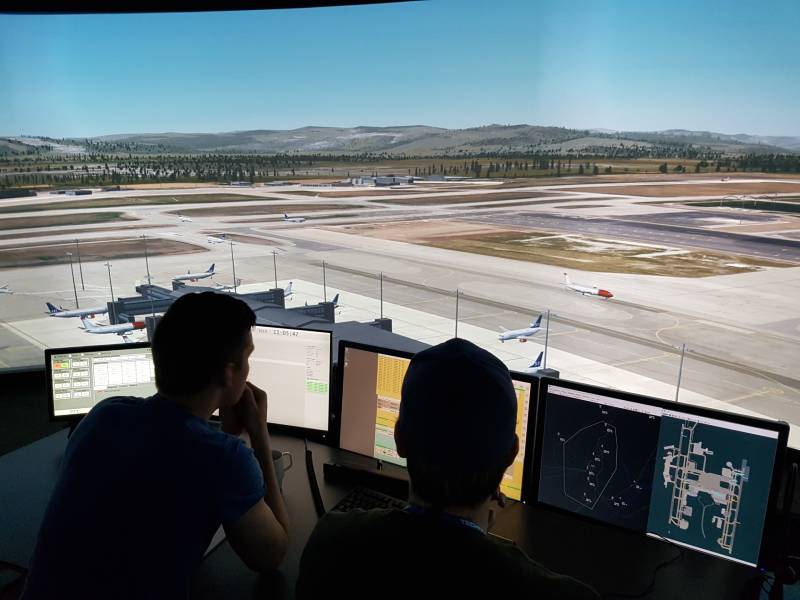Want to become an Air Traffic Controller?
Would you like to monitor and direct aircrafts in the airspace and aircrafts at and around airports?
Then Air Traffic Control might be for you!
Your job as an air traffic controller (ATCO) is to ensure safe operations of aircrafts, coordinate their movements and keep them at safe distances from each other. You will direct aircrafts during takeoff and landing from airports, direct them around bad weather and ensure that traffic flows smoothly with minimal delays.
Composition of the ATCO Training
The duration of the initial training provided by Integra Aviation is scheduled to approximately five months, depending on the number of students per course. The training modules alternate between theoretical and practical training in simulator. The student will, however, spend most of his/her time at a unit where the operational training is done, eg in a control tower.
All ATCO students must receive training where they obtain the basic knowledge, skills and practical experience required for all controllers. This training is called ‘Initial Training’ and it comprises ‘Basic Training’ and ‘Rating Training’. The initial training covers the following subjects:
- Aviation law
- Air traffic management
- Meteorology
- Navigation
- Aircraft
- Human factors
- Equipment and systems
- Professional environment
- Abnormal and emergency situations
- Aerodromes
Rating Training includes the theoretical and practical training that is needed to obtain the knowledge, skills and attitudes required to specific ratings. After having completed the initial training successfully, the ATCO candidate will be awarded a student ATCO license.
The student ATCO license allows the student to proceed with the next phase, which is the ‘Unit Training’. The unit training, which also takes approximately a year and a half, is designed to provide the ATCO candidate with the experience he or she needs to obtain the ATCO license with appropriate rating and unit endorsements. This phase is a mix between exercises in simulator and operational training at a unit which is designed to allow the trainee to acquire and consolidate the specific routines and procedures that are specific to the unit.
After the successful completion of the Unit Training, the student will be awarded an ATCO Licence.
The validation of the ATCO Licence depends on the results of the following refresher training, competence assessments and medical checks which are to be taken every 6 or 12 months.

Simulator training at our training centre in Oslo, Norway.
Requirements
For students to be eligible for admission to ATCO Training with Integra Aviation, the candidate must pass an admission test.
- To be eligible for the admission test, the candidate must:
Hold a High School Diploma or a General Certificate of Secondary Education (GCSE) with good results in English and Mathematics. - The age is not explicitly a requirement to obtain an air traffic controller licence and the age requirements vary according to country. However, in practice the minimum age to become an air traffic controller is 18 years old pluss duration of the unit training.
- You must have normal colour vision and your visual acuity must be 6/9 or better in each eye separately and 6/6 together.
- Be fit and enjoy a health which is good enough to pass the ATCO Medical Examination.
Admission Test
At the moment Integra Aviation uses a test called FEAST* (First European Air Traffic Controller Selection Test).
The test consists of 4 steps. The candidate must pass each step to move on to the next.
• Step 1 – FEAST is a computer-based test developed to measure basic skills and abilities in decision-making, planning ability, memory, logical reasoning, visual perception, attention, multi-tasking and spatial orientation. This phase also includes a test on your English language knowledge.
• Step 2 – FEAST Dynamic ATC Radar test (DART) and FEAST MULTIPASS test which are developed to test the candidate’s multi-tasking abilities. The tests are more complex and will require the candidate to perform a number of different tasks at the same time as is done by an Air Traffic Controller.
• Step 3 – a personal interview.
When all three steps have been passed successfully, the candidate must take a medical test offered by an Aeromedical Examiner with diploma in Aviation Medicine and a security clearance test.
*We are currently working on finding another screening test for election of ATCO student candidates.
Contact
If you have questions regarding the Air Traffic Controller Training, you are welcome to contacts:
General Manager
Aleksander Hedqvist
[email protected]

Integra Aviation
Provider of consultancy and services as well as training and education for the aviation industry. Provider of advanced drone solutions to private and public organizations.
Contact
Integra Aerial Services & Aviation Academy
Lufthavnvej 131
Hangar 16
DK-5270
Odense N